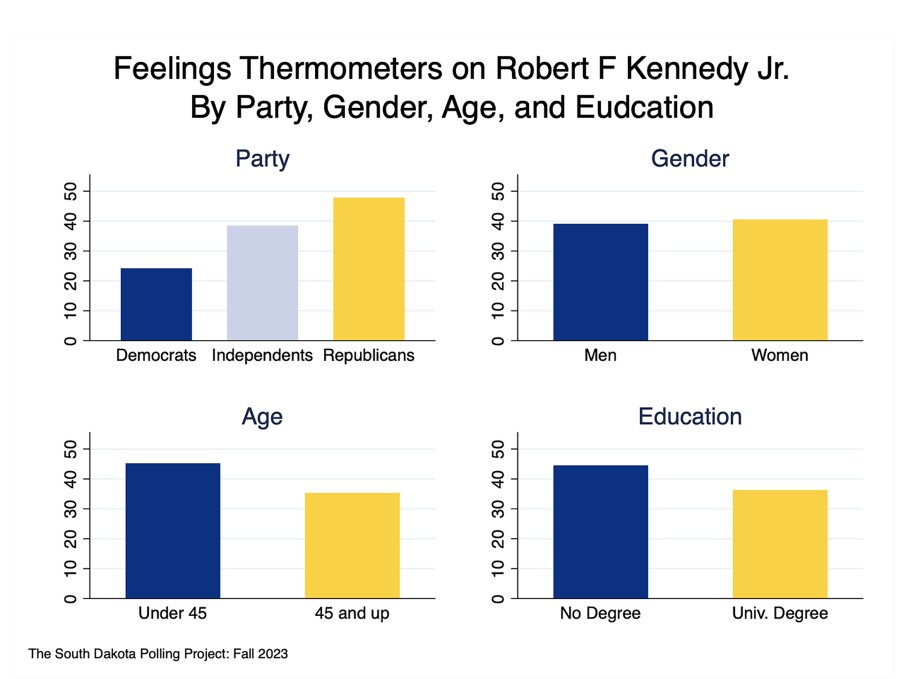By David Wiltse, Ph.D., and Filip Viskupič, Ph.D.
The Fall 2023 Poll, conducted from Nov. 18 to Dec. 4, 2023, is a survey of the South Dakota electorate conducted by The South Dakota Polling Project — a non-partisan research group housed in the School of American and Global Studies at South Dakota State University. In this poll, 782 registered voters answered questions about political figures and policy questions of concern to South Dakota residents. As with all polls of the electorate conducted by the Polling Project, respondents were randomly sampled from the South Dakota Voter File of all registered voters in the state and weighted the data on known population parameters to closely match the characteristics of the state’s population. The margin of error of this survey was +/- 3.5%, similar to most statewide polls.
The 2024 election is rather unique in the fact that despite both the Republican and Democratic frontrunners are firmly in the lead of the nomination contest, there is tremendous dissatisfaction with both presumed nominees from the general electorate. Many observers have seen this paradox as an opportunity for a third-party or independent candidate to impact the race.

Historically, third-party bids are unsuccessful and disproportionately harm one party over the other giving them a reputation of acting as a spoiler. Perhaps none was as dramatic as Theodore Roosevelt’s bid in 1912 that fractured the dominant Republican party allowing the Democrats to cruise to an electoral college majority. For a variety of idiosyncratic reasons, the independent candidacy of Robert F. Kennedy Jr. has attracted the most attention and gotten the most traction with the public.
Now, we must be very clear about a few things this far ahead of the election. The most important of which is that it is very easy for people to indicate openness to a third party or independent this far out. Yet, when people are casting actual votes, most of those who had once entertained thoughts of straying from their normal party will change their minds once the reality of the exceedingly low probability of the outside candidate winning sinks in. Only once in our history – the 1860 election — did we have a newly formed party take the White House, and that was after the Republicans had won House majorities. The alternatives to the 2024 major party nominees, in contrast, are running largely by themselves without a supporting cast of partisan activists successfully contesting lower-level elections.
That said, it is important to parse out where Kennedy’s support is coming from, largely because it highlights weaknesses in the two dominant party coalitions. Overall, his rating is on the “cool side” at just under 40.
Below, the results of Kennedy’s feeling thermometer broken down by party, gender, age and education are presented; all are important dividing lines in politics. In no subset of the electorate the poll looked at was he polling on the “warm side” of the thermometer. First, there is a clear “coolness” for Kennedy amongst Democrats, despite his relation to Democratic Party “royalty.” We conjecture that this is largely due to the perceived threat of RFK acting as a spoiler in 2024. Conversely, RFK’s rhetoric on vaccines largely echoes much of what we’re hearing on the far-right of the Republican Party.
There were also sharp differences between those younger than 45 and those 45 and older. While RFK is not young at the age of 69, he is eight years younger than Trump and 12 years younger than Biden. Should both Biden and Trump be nominated, they will be the oldest presidential candidates in our history. Considering that fact, it is no surprise that Kennedy has some traction with younger voters. Kennedy is also disproportionately liked by non-college graduates. Here, too, his populist rhetoric resonates well in certain quarters of the Republican coalition. There was virtually no difference between men and women in our poll.

Taking all this together, the evidence we’ve amassed here questions the popular perception that Kennedy’s presence will systematically draw more voters that would otherwise vote Democratic than Republican, thus spoiling Biden’s reelection prospects. That said, with an electorate that is as volatile as ours is now and the structure of the electoral college, it is perfectly reasonable for Democrats and Biden to be fearful of the net effect of RFK’s candidacy.

